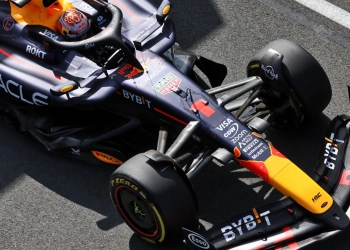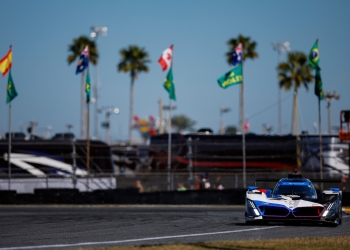Stewards at the Abu Dhabi Grand Prix have dismissed Haas’ protest against Force India, but have asserted that the latter is a new constructor as of August 2018.
Haas lodged a protest against Force India on Thursday, though neither party divulged further detail on the specific reason. Whilst it was later revealed to relate to Force India's use of a car they hadn't designed – due to the recent takeover and formation of a new entry – it's understood the real reason behind the protest is to question Force India’s right to claim prize money.
A lengthy hearing took place on Friday, in which Haas and Force India chiefs and legal representatives, along with Formula 1 and FIA figures, were present.
On Saturday the stewards issued a lengthy verdict in which several crucial details were outlined.
Haas’ protest alleged that Racing Point Force India (RPFI) was not a “constructor”, as set out in the Sporting Regulations of the 2018 Formula 1 championship.
Haas’ counsel argued that RPFI did not design its Listed Parts, as outlined in the regulations, while RPFI’s counsel defended such claims.
It outlined that the FIA had “absolute discretion” to accept RPFI as a new constructor.
The stewards sided with Force India – but noted that it was accepted as a new constructor mid-season, which could potentially have prize money ramifications, as new teams aren't subject to prize money payouts until their third season in the sport.
Full list of decisions by the stewards:
Decision 1
In relation to the Racing Point Force India F1 Team submission that the Haas Formula One Team has no jurisdiction to challenge the decision of the FIA to accept its entry in the Championship under Article 8.5 of the 2018 Formula One Sporting Regulations, the Stewards decide that the Haas Formula One Team does in fact have the right under Article 13.2.1 of the Code to protest this action by the FIA. This article states a competitor has the right to protest against "the Entry of a Competitor or Driver".
Decision 2
The Racing Point Force India F1 Team argued the protest was not timely. The Stewards decide that the protest is timely because a significant amount of information was only available to the Haas Formula One Team in very recent times and further, Article 13.3 of the Code allows a protest to be lodged against the entry of a Competitor or Driver at an event, within 2 hours of the closing time for Official Scrutineering and Haas complied with this requirement.
Decision 3
In relation to the "Budapest Agreement" the Stewards decide that the assertion that this document waives the right of the Haas Formula One Team to object to an entry is not consistent with the wording of that Agreement but in any case, as submitted by the FIA, because the FIA was not a party to the Agreement, it has no relevance in regulatory matters.
Decision 4
In relation to the submission by the Racing Point Force India F1 Team that it is not a new team, the Stewards decide that the Racing Point Force India F1 Team is indeed a new team. It is a separate and different legal entity to the Sahara Force India F1 Team and it holds a different ASN Competition License issued by the MSA of Great Britain and a different FIA Super License. Therefore, it cannot be considered as the "same team" as the former Force India.
Decision 5
In relation to the Racing Point Force India F1 Team procuring Listed Parts from the Sahara Force India F1 Team (in Administration) the Stewards decide that the former team was not a "competitor" within the meaning of Appendix 6 Article 2 b) of the 2018 F1 Sporting Regulations. The former team was no longer a competitor in the 2018 Formula One World Championship as it had as of August 16, forfeited all its rights and ability to field two cars at any further Grand Prix in 2018. The Force India Formula One Team ceased to meet the FIA definition of both a Competitor and a Constructor on 16 August 2018 when all of its assets were sold. At that point it no longer possessed the resources to meet its obligations as either a competitor or constructor.
Decision 6
The Stewards decide in relation to the definition of "Outsourcing" that there is no regulatory support for the argument that Outsourcing of Listed Parts cannot come from a former or excluded team and therefore the procurement, by the Racing Point Force India F1 Team of Listed Parts from the Administrator, was permitted under the wording of Appendix 6 of the 2018 F1 Sporting Regulations.
Decision 7
The Stewards therefore decide that the Racing Point Force India F1 Team satisfied, from August 23, 2018, the definition of a "Constructor" under the 2018 FIA Formula One Sporting Regulations. The reasons for this are;
1. Racing Point Force India F1 Team became a Competitor on 23 Aug 2018 when its Super License was signed and issued by the FIA.
2. The Racing Point Force India F1 Team was recognized by the FIA as an F1 Constructor on 23 Aug 2018 when its F1 Entry Form was accepted, resulting in the issuance of its Super License, and when on the same day it signed the Bilateral Settlement Agreement with the FIA.
Decision 8
The Stewards decide that the entry of Racing Point Force India Formula One Team is a valid entry in the 2018 Formula One World Championship because the FIA, under Article 8.5 of the Formula One Sporting Regulations has absolute discretion to accept or reject an application to compete in the Championship and under Article 8.1 has the right to accept a late entry if a place is available.
Decision 9
The Stewards decide to dismiss the protests lodged by Haas Formula One Team against Car number 11 and car number 31. The Steward note their belief that the protests were lodged in good faith considering that there was significant material that only came to the attention of the protesting party, in recent times.
Competitors are reminded that they have the right to appeal the decisions of the Stewards (with the exception of those referred to in Article 12.2.4 of the FIA International Sporting Code), in accordance with Article 15 of the FIA International Sporting Code and Article 9.1.1 of the FIA Judicial and Disciplinary Rules, within the applicable time limits.






